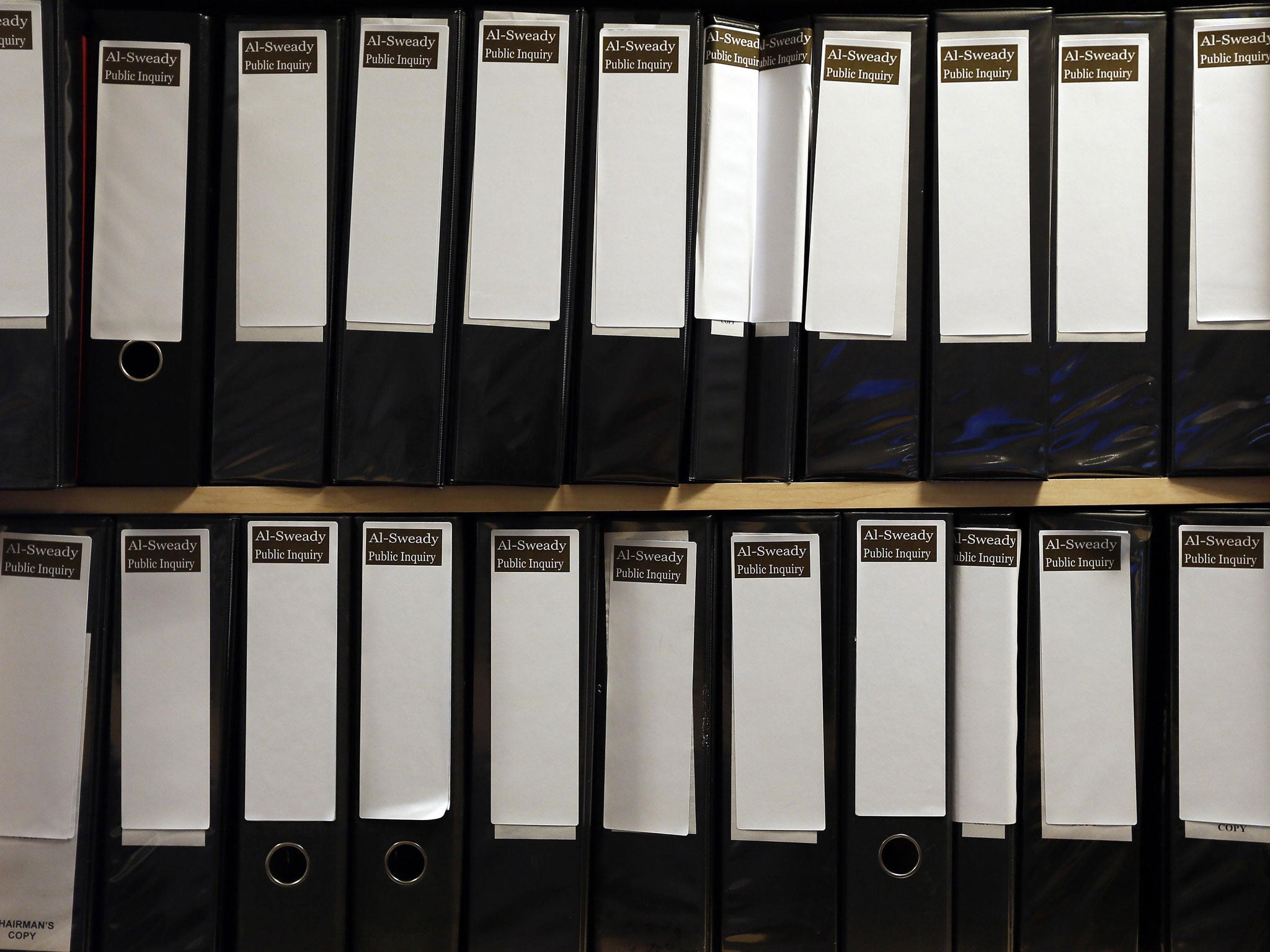Your support helps us to tell the story
From reproductive rights to climate change to Big Tech, The Independent is on the ground when the story is developing. Whether it's investigating the financials of Elon Musk's pro-Trump PAC or producing our latest documentary, 'The A Word', which shines a light on the American women fighting for reproductive rights, we know how important it is to parse out the facts from the messaging.
At such a critical moment in US history, we need reporters on the ground. Your donation allows us to keep sending journalists to speak to both sides of the story.
The Independent is trusted by Americans across the entire political spectrum. And unlike many other quality news outlets, we choose not to lock Americans out of our reporting and analysis with paywalls. We believe quality journalism should be available to everyone, paid for by those who can afford it.
Your support makes all the difference.A long-running inquiry into claims that British troops killed and tortured Iraqi civilians a decade ago will deliver its final report today.
The judge-led Al-Sweady inquiry, which has cost the taxpayer around £25 million, will deliver its conclusions following a five-year process.
It has examined claims that 20 or more Iraqis were unlawfully killed while in custody, bodies were mutilated and detainees were ill-treated following a fierce firefight known as the Battle of Danny Boy in May 2004.
After almost 300 witnesses in central London gave evidence during a year of public hearings, lawyers representing the alleged victims' families admitted that there was no evidence of unlawful killing.
But they stood by claims regarding the alleged mistreatment of prisoners at Camp Abu Naji (CAN) near Majar-al-Kabir in southern Iraq and later at Shaibah Logistics Base.
Lawyers for the soldiers involved and the Ministry of Defence (MoD) say the allegations are part of a "conspiracy" by a number of Iraqis to pervert the course of justice and get compensation payments.
The MoD has admitted there had been "some instances" where conduct of British soldiers fell below expected standards, such as a detainee being shouted at and plasticuffs being applied incorrectly.
However, it insists that these lapses were on a different scale to the allegations of murder, torture and mutilation put forward by the Iraqis.
Inquiry chairman Sir Thayne Forbes has been considering his conclusions since April this year, when he heard closing submissions.
The retired High Court judge is expected to make a 40-minute statement this morning, after which the report will be laid before Parliament.
Defence Secretary Michael Fallon will later make a statement to the House of Commons regarding its findings.
The inquiry is named after Hamid Al-Sweady, a 19-year-old student whose father Mizal Karim Al-Sweady claimed he was murdered after being detained by British troops.
It was ordered by then Defence Secretary Bob Ainsworth in November 2009 amid concerns by High Court judges that the MoD had not properly investigated the events of May 2004.
The inquiry, which as of November 30 this year had cost £24,598,372, started oral hearings in March 2013 and heard from 282 witnesses.
According to the inquiry's website, investigation and expert services costs have run up to £7,332,477.
Running costs including IT and accommodation are at £6,475,324, counsel and legal services cost £5,612,484, witness costs are at £2,990,251 and general staffing cost £2,187,836.
Sir Thayne's full report is expected to run up to 1,500 pages after the inquiry considered around 5,000 documents following a "massive" disclosure exercise.
Earlier this month, Mr Fallon expressed anger over the case, saying in a private speech quoted by The Times that it had cost taxpayers £30 million to expose what appeared to be "barefaced lies".
The Defence Secretary reportedly said that three public inquiries, more than 200 judicial reviews or applications for them and more than 300 personal injury claims from Iraqi or Afghan nationals had cost the Government almost £90 million.
"These include legitimate cases but in the last couple of years we have seen the lodging of claims on a virtually industrial scale, most brought many years after the alleged events," Mr Fallon said.
"We will be asking the courts to deal robustly with cases where the system is being abused and we should also give due consideration to the way in which increased legal consideration and perception of this constraint has given rise to a misplaced sense of entitlement amongst claimants and encouraged by lawyers without scruples."
In September 2011, a separate inquiry found that Iraqi detainee Baha Mousa died with 93 injuries in British army custody in Basra in 2003.
Its chairman, Sir William Gage, blamed "corporate failure" at the MoD for the use of banned interrogation methods.
PA

Join our commenting forum
Join thought-provoking conversations, follow other Independent readers and see their replies
Comments